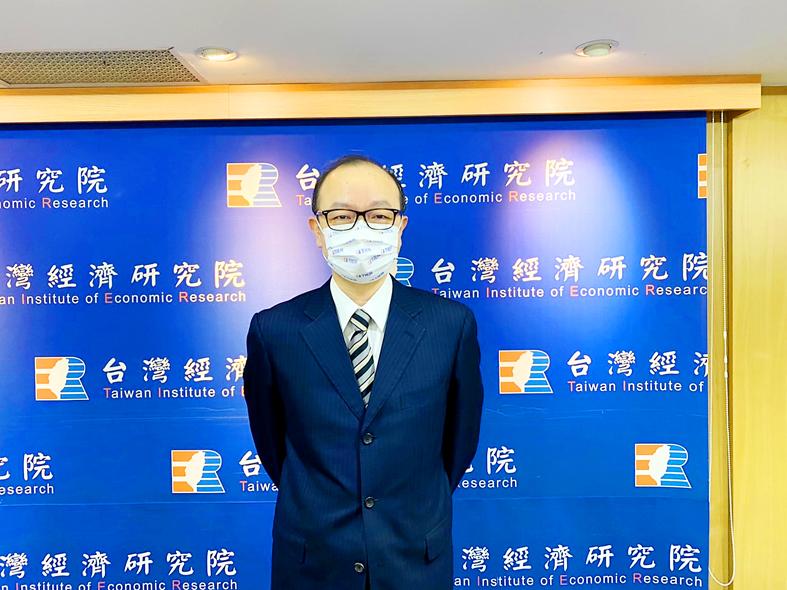The Taiwan Institute of Economic Research (TIER, 台灣經濟研究院) yesterday trimmed its forecast for GDP growth this year from 4.1 percent to 3.81 percent, as private consumption was softer than expected because of COVID-19 infections and consumer price hikes.
However, the Taipei-based think tank raised its projection for exports and imports, which it said have benefited from robust global demand driven by digital transformation and technological innovations.
TIER Economic Forecasting Center director Gordon Sun (孫明德) attributed the softer GDP projection to weaker-than-expected private consumption in the first six months of the year.

Photo: Allen Wu, Taipei Times
Domestic demand, a main GDP component, would soon improve now that COVID-19 cases have declined, and people have resumed going out and shopping, Sun said.
Private consumption is expected to grow 3.05 percent this year, a drop of 1.38 percentage points from the previous forecast in April, TIER said.
Meanwhile, consumer prices are expected to gain 2.95 percent, subduing the benefits of pay raises, it said.
Private investment remains firm at 4.25 percent, as major tech companies pressed ahead with capacity expansion plans, Sun said.
Despite ongoing tech cycle corrections, TIER increased its growth forecast for exports and imports to 13.16 percent and 16.9 percent on the back of a better performance in the first half.
More than 50 percent of Taiwanese exports are destined for the US and China, but the world’s two largest economies are being affected by the war in Ukraine, as well as steep energy and commodity price hikes, TIER said.
In a related development, companies from various sectors are less confident about their business prospects in the next six months, it said, citing a monthly survey.
The sentiment gauge for the manufacturing industry fell 4.29 points to 92.59, the lowest since June 2020, with companies in the tech sector more pessimistic than those in non-tech fields, it said.
Service providers held relatively resilient in light of a 0.87 point drop in business outlook, TIER said.
Transportation companies, logistics service providers and wholesale operators have negative outlooks, but retailers, hospitality companies and financial institutes have regained some confidence, it said.
Civil engineering companies, property developers and brokers turned conservative, citing rising construction costs and weakening demand, it said.
The confidence measure for builders and realtors fell 3.15 points to 92.92, the worst showing since May 2020, it said.

Vincent Wei led fellow Singaporean farmers around an empty Malaysian plot, laying out plans for a greenhouse and rows of leafy vegetables. What he pitched was not just space for crops, but a lifeline for growers struggling to make ends meet in a city-state with high prices and little vacant land. The future agriculture hub is part of a joint special economic zone launched last year by the two neighbors, expected to cost US$123 million and produce 10,000 tonnes of fresh produce annually. It is attracting Singaporean farmers with promises of cheaper land, labor and energy just over the border.

US actor Matthew McConaughey has filed recordings of his image and voice with US patent authorities to protect them from unauthorized usage by artificial intelligence (AI) platforms, a representative said earlier this week. Several video clips and audio recordings were registered by the commercial arm of the Just Keep Livin’ Foundation, a non-profit created by the Oscar-winning actor and his wife, Camila, according to the US Patent and Trademark Office database. Many artists are increasingly concerned about the uncontrolled use of their image via generative AI since the rollout of ChatGPT and other AI-powered tools. Several US states have adopted

KEEPING UP: The acquisition of a cleanroom in Taiwan would enable Micron to increase production in a market where demand continues to outpace supply, a Micron official said Micron Technology Inc has signed a letter of intent to buy a fabrication site in Taiwan from Powerchip Semiconductor Manufacturing Corp (力積電) for US$1.8 billion to expand its production of memory chips. Micron would take control of the P5 site in Miaoli County’s Tongluo Township (銅鑼) and plans to ramp up DRAM production in phases after the transaction closes in the second quarter, the company said in a statement on Saturday. The acquisition includes an existing 12 inch fab cleanroom of 27,871m2 and would further position Micron to address growing global demand for memory solutions, the company said. Micron expects the transaction to

A proposed billionaires’ tax in California has ignited a political uproar in Silicon Valley, with tech titans threatening to leave the state while California Governor Gavin Newsom of the Democratic Party maneuvers to defeat a levy that he fears would lead to an exodus of wealth. A technology mecca, California has more billionaires than any other US state — a few hundred, by some estimates. About half its personal income tax revenue, a financial backbone in the nearly US$350 billion budget, comes from the top 1 percent of earners. A large healthcare union is attempting to place a proposal before